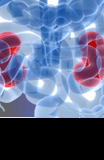Background information
Familial benign hypocalciuric hypercalcaemia is an autosomal dominant disorder of extracellular calcium homeostasis, characterised by lifelong hypercalcaemia with inappropriately low urinary calcium excretion (mean urinary calcium:creatinine clearance ratio <0.01).
Identification of pathogenic variants in the genes responsible for FHH can confirm the diagnosis based on clinical / biochemical presentation. This can assist in directing patient management and whether surgical intervention is required.
It is a genetically heterogeneous condition where the types are clinically indistinguishable.
To date the following genes have been identified as causative of FHH:
CASR: Pathogenic loss of function mutations in the CASR gene account for FHH type1 (FHH1). ~65% of individuals with definite FHH are reported to have a pathogenic variant in this gene.
GNA11: pathogenic variants in this gene are causative of FHH type 2 (FHH2). Nesbit et al., 2013, NEJM, identified pathogenic GNA11 variants in >10% CASR and AP2S1 mutation negative FHH patients (although the cohort tested was small; prospective testing in clinical cohorts indicates variants in GNA11 to be a very rare cause of FHH).
AP2S1: The molecular basis of FHH type 3 (FHH3) has been identified as mutation of codon p.Arg15 of the AP2S1 gene. >20% of CASR negative FHH patients have this mutation (Nesbit et al., Jan 2013, Nature Genetics).
Testing strategy
Clinically affected probands:
Analysis for small variants in the gene panel indicated below
Individual gene analysis is available to non NHSE referrals where clinically indicated
Genes tested:
Genes analysed are in accordance with the 'green high evidence of clinical association gene list in panel app: CASR, GNA11, AP2S1 (targetted codon 15 only)
Targeted analysis for known / previously reported familial variants:
- Presymptomatic testing in clinically unaffected family members at risk of inheriting a previously reported familial pathogenic variant (R242)
- Diagnostic confirmation in individuals at risk of inheriting a previously reported familial pathogenic variant and clinically suspected of having the familial condition (R240)
- Segregation studies in affected family members to aid variant interpretation (R375)
- Prenatal diagnosis is not typically requested
Target reporting times
Turnaround times for genetic / genomic testing
Sample requirements and referral information
All referrals should ideally be accompanied by a completed pre-referral form.
Clinical guidance and advice is available to referring consultants from:
Professor Rajesh Thakker, Professor of Medicine
OCDEM, Churchill Hospital
Email: rajesh.thakker@ndm.ox.ac.uk
Requesting specialties:
- Endocrinology
- Clinical Genetics
Specimen requirements and referring samples
Price list for non NHSE referrals (pdf)




























































